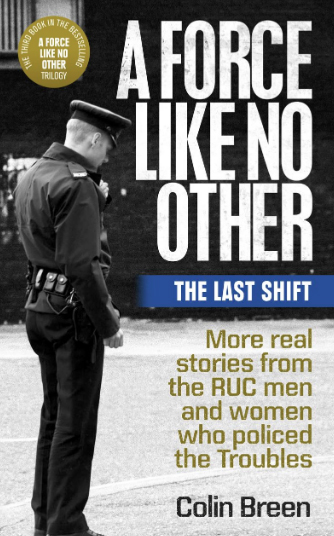Author: Colin Breen
ISBN No: 9781780733319
Review date: 19/04/2024
No of pages: 293
Publisher: Blackstaff Press
Publisher URL:
https://blackstaffpress.com/a-force-like-no-other-the-last-shift-9781780733319
Year of publication: 31/01/2022
Brief:
A Force Like No Other: The Last Shift is an evocative book of a time and a place – Northern Ireland during the Troubles of 1969 to 2001.
While it’s the third book in a series by Colin Breen – the first came out in 2015 – the sub-title ‘Last Shift’ implies that this is the final one of Royal Ulster Constabulary officers’ recollections, serious and light-hearted, moving and amusing. However he does include an email address, which implies that he is open to a further book. If supply of memories and demand is there, why not?
For as Breen suggests in a foreword, he began imagining the book would consist of police black humour – among the RUC as in any force – only for the book to evolve, ‘into a more layered and broad-ranging history of what it was like to police a divided community on a day to day basis, and the danger that this work entailed’.
As for the work, just as Ireland, north and south, does not want nor deserve to be identified by terror alone, so this book is about non-terrorist crime. One of the longer stories (pages 58-76) is about a crime of passion, the detailed forensic evidence, and the unsatisfactory legal outcome. One of the sadder stories (pages 20-23) is about the unsolved murder of an Interrailing German student, Ingar Maria Hauser, whose parents died without having at least the knowledge of how their daughter died. As in most of the stories, you don’t get an exact date or even year, although that the dead woman was from ‘West Germany’ dates the case to before 1990.
As one former RUC officer recalls (page 19): “Belfast in the early eighties was a place of danger: a place run by terrorists, where law and order were difficult and dangerous to enforce. It has undergone an incredible transformation since the ceasefires”, but not before 302 police were killed and thousands injured.
You do not turn to this book for a narrative of policing in Northern Ireland in that era, nor its wider society, let alone to learn of the indifference of the rest of the British Isles to the province. The stories are anonymous, so that it can take some working out that the teller is a woman. You do get life in the raw, with all its absurdities, such as during the marches to mark the death of hunger strikers in the early 1980s, a rubber bullet pierced the drum that brought out householders onto the streets (‘I can see the drummer’s face yet. I honestly thought he was going to cry.’)
As you turn the pages, what you do get are answers – to questions controversial at the time and since, such as: what backing did the IRA have in republican areas (a majority of people didn’t want the violence, ‘they wanted to live normally’); was the RUC a sectarian Protestant body (‘I come from a Catholic background and I must say that never once did I feel any animosity from my colleagues’ – page 58) and how helpful were the police in the Irish Republic, the Garda, to the RUC (‘I can say, hand on heart, that relations between us and the Garda were excellent. The Garda saved my life on a number of occasions with information’ – page 91).
Apart from the foreword and a few lines of explanation, the book is only the words of RUC men and women – and, importantly, their wives and widows (‘there was absolutely no help for either the officers or the wives and families of wives or widows’ – page 269).
Arguably the most visceral story (among so many) is from the year 2000 and the Drumcree parade, when public order police got ‘hammered’ (pages 44-47); by petrol bombs, acid and breeze blocks. For all the bombs, and shootings, more subtle and present in many of the stories is the sense that nowhere was safe, in urban Belfast or the small towns in the countryside; even injured police in a civilian hospital might have to be airlifted to a military hospital, in case of gunmen making a further attempt. As the stories of violent and sudden death accumulate, in passing you gain a sense of the toll on people; the ones who turned to drink; who wished for a new life in Canada.
The only thing regrettably missing from my copy of this excellent value for money, gripping, important gathering of stories, well within living memory and that all sorts of people are living with still, is an index.
See the publisher’s website for more of Colin Breen’s books, including a similar one on the reporting by journalists of the Troubles.










